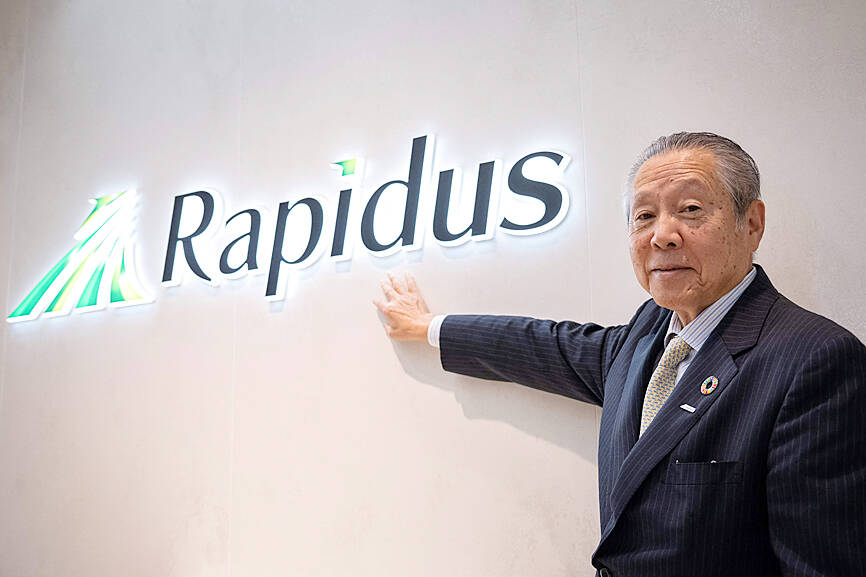Japan is set to spend roughly ¥252.5 billion (US$1.6 billion) in an extra budget to further support developments of artificial intelligence (AI) and semiconductors.
The sum is much smaller than the about ¥1.5 trillion allocation in last year’s supplementary budget, as the government is expected to start securing most of the additional funding for those sectors in regular budgets going forward, a ruling party lawmaker and the Japanese Ministry of Economy, Trade and Industry (METI) said.
That is expected to provide more stable funding to the sectors.

Photo: AFP
After Japanese Prime Minister Sanae Takaichi’s Cabinet signed off on it yesterday, the extra budget now needs approval in parliament. That passage is expected to go more smoothly, as Takaichi’s ruling coalition is reportedly set to secure a majority in the powerful lower house due to the addition of a small caucus.
So far, Japan has set aside about ¥5.7 trillion since it came up with a new strategy in 2021 to revive the nation’s semiconductor industry. The government has been allocating sums to specific projects such as Rapidus Corp, Taiwan Semiconductor Manufacturing Co’s (台積電) Kumamoto foundries and Micron Technology Inc’s Hiroshima factory.
In the extra budget, the METI has also requested ¥100 billion to invest in Nippon Export and Investment Insurance to strengthen the government-backed trade insurer’s financial foundation. The insurer is set to play a key role in implementing a US$550 billion investment program as part of the US-Japan trade deal.
The ministry also aims to secure ¥93.7 billion in the supplementary budget to help private companies secure rare earths and strengthen national stockpiles of the critical minerals. Japan has tried to reduce its reliance on China for rare earths for economic security reasons.

Taiwan Semiconductor Manufacturing Co (TSMC, 台積電) last week recorded an increase in the number of shareholders to the highest in almost eight months, despite its share price falling 3.38 percent from the previous week, Taiwan Stock Exchange data released on Saturday showed. As of Friday, TSMC had 1.88 million shareholders, the most since the week of April 25 and an increase of 31,870 from the previous week, the data showed. The number of shareholders jumped despite a drop of NT$50 (US$1.59), or 3.38 percent, in TSMC’s share price from a week earlier to NT$1,430, as investors took profits from their earlier gains

In a high-security Shenzhen laboratory, Chinese scientists have built what Washington has spent years trying to prevent: a prototype of a machine capable of producing the cutting-edge semiconductor chips that power artificial intelligence (AI), smartphones and weapons central to Western military dominance, Reuters has learned. Completed early this year and undergoing testing, the prototype fills nearly an entire factory floor. It was built by a team of former engineers from Dutch semiconductor giant ASML who reverse-engineered the company’s extreme ultraviolet lithography (EUV) machines, according to two people with knowledge of the project. EUV machines sit at the heart of a technological Cold

TAIWAN VALUE CHAIN: Foxtron is to fully own Luxgen following the transaction and it plans to launch a new electric model, the Foxtron Bria, in Taiwan next year Yulon Motor Co (裕隆汽車) yesterday said that its board of directors approved the disposal of its electric vehicle (EV) unit, Luxgen Motor Co (納智捷汽車), to Foxtron Vehicle Technologies Co (鴻華先進) for NT$787.6 million (US$24.98 million). Foxtron, a half-half joint venture between Yulon affiliate Hua-Chuang Automobile Information Technical Center Co (華創車電) and Hon Hai Precision Industry Co (鴻海精密), expects to wrap up the deal in the first quarter of next year. Foxtron would fully own Luxgen following the transaction, including five car distributing companies, outlets and all employees. The deal is subject to the approval of the Fair Trade Commission, Foxtron said. “Foxtron will be

INFLATION CONSIDERATION: The BOJ governor said that it would ‘keep making appropriate decisions’ and would adjust depending on the economy and prices The Bank of Japan (BOJ) yesterday raised its benchmark interest rate to the highest in 30 years and said more increases are in the pipeline if conditions allow, in a sign of growing conviction that it can attain the stable inflation target it has pursued for more than a decade. Bank of Japan Governor Kazuo Ueda’s policy board increased the rate by 0.2 percentage points to 0.75 percent, in a unanimous decision, the bank said in a statement. The central bank cited the rising likelihood of its economic outlook being realized. The rate change was expected by all 50 economists surveyed by Bloomberg. The